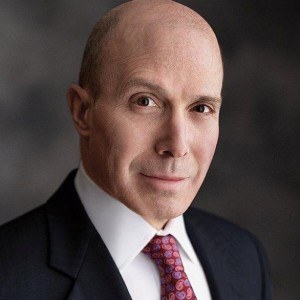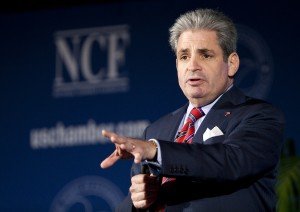Great leaders promote trust and open communication, experts increasingly argue. Property/casualty insurance executives understand this, especially in times of great change—a fact that was in evidence at least twice in recent weeks as Evan Greenberg, CEO of ACE Limited, and Jay Fishman, CEO of Travelers, opened the lines of communication—and their hearts—in addressing employees about the future of their companies and personal challenges.
Here are some excerpts of what they said.
Evan Greenberg on the future of Chubb
Speaking to Chubb employees about the future of their jobs and their company as operations are integrated with ACE’s, Greenberg offered these thoughts:
- On merger uncertainty
“I say what I think. I acknowledge it right up front. It’s an awkward moment….It’s an unsettled moment. Moments like this create tremendous uncertainty. They make people uneasy, and the one promise I can give you is to the extent I am in control of it, we will make decisions rapidly and that we’ll communicate and provide answers and clarity as we know it and as we’re allowed to provide it. That I promise you…
- On Chubb’s culture

“I’ve admired and competed and respected this venerable company from a distance for many, many years.…. “It is an underwriting company, technical, professional—[showing] professional excellence in underwriting, claims, actuarial training, sales and distribution management, deep customer domain knowledge, [with] a service culture [that] treat[s] employees and customers and distribution partners well. You have a well-earned reputation for that….
“The culture from what I can tell is deliberate and buttoned up in how you go about what you do, and again, understated, quietly proud. I admire those traits.”
“We will preserve, enhance, and learn from the Chubb claims practices and organization. We’re committed to great service, which is one of the reasons why we decided to take the Chubb name, that we would do that. It represents quality, and it represents a sign of respect and appreciation for what the company is all about. I don’t know any other way to show respect to somebody to begin with than to say we’re going to take your name. Do you think for a minute that that idea goes down well inside ACE? Do you think they all are uplifted by that? No, they’re offended by it.”
- On ACE’s culture
“While we’re decent and we’re kind to each other and that is important within our culture, we are very frank and we don’t mistake frankness for rudeness. It’s not. We admit easily what we don’t do well or could do better or where we could improve because there’s no shame in that. We do that openly, and we admire that and put that on a pedestal within our culture. We insist upon it so that all levels of the organization will constantly improve, including me and my office….
“Another hallmark of the ACE culture is generosity of spirit. We help each other out. People look laterally. They don’t simply do what’s good for their business or good for them. They honest to God think about what’s best for the organization and… when we give individuals their performance reviews, we actually note that. How generous are you of spirit?
“We’re humble. We’re optimistic. ACE is a very optimistic company. We’re youthful. We’re a flat organization. There are not a lot of layers of management in the company, and the higher you go in the organization, the harder you’re expected to work. We’re in touch with detail. We’re very decision-making oriented, and in our company, decision-making happens very, very rapidly.
Management is close to the action. We’re not remote. We work at 10,000 feet and we work at ground zero every single day, and I’ll tell you what, to win an account, if it’s $50,000 or more, I’ll throw myself out the window myself to win that account.
- On integration and the future
“The integration is not going to be easy. I’m not going to sugar coat it. I’m not going to insult people by saying that. [But] I am going to say again, this is about growth. If this was simply about expense efficiency, then it makes no sense. It’s about growth, and it’s about efficiency, and it’s about improving our competitive profile, and it’s efficiency also that gives us a license and a flexibility to invest and grow and expand the combined organization. That’s what it’s about, and it’s about greater good…
“We’re not going to end up stapling the two organizations together. That’s a mistake. That’s not integrating…
[L]eadership will be equal in both. In North America, ACE will not be over Chubb. International, home office, back office— we’re going to fold them into one. There is no way for me to say it other than plainly to you. It’s obvious. You’re not going to end up with two home offices, you’re not going to end up with two of all support functions. You’re going to have one…
“There is going to be a rewarding, appropriate position for the vast majority of employees of both companies without a doubt. It will provide an opportunity for growth, for personal advancement, an ability to serve the company doing what you do well. Senior management of both companies, again, will select the best of breed. Wherever there is overlap, we will treat all employees with respect, with decency, and fairness.
“Looking forward is what it’s about. I know there are all kinds of emotion flying. I know there’s resentment. I know there’s anger. I know there’s uneasiness. In some, there’s even fear. But at some point, you guys have to make a decision about your company, and you’ve got to make it soon.
“Don’t wallow. Be a part of this journey. Take what we are creating and help build it. Improve upon and preserve it. Be a part of the history and the future of this….
The featured remarks were taken from a transcript of a Chubb Employee Town Meeting webcast featuring Greenberg, which took place on July 20, 2015. The full transcript is available online on the Securities and Exchange Commission website.
Jay Fishman on the appointment of a new CEO at Travelers

When Travelers announced that Alan Schnitzer would exceed Fishman as CEO, the company also shared a letter from Fishman to his employees, sharing that a previously disclosed neuromuscular condition has been diagnosed with a variant of Amyotrophic Lateral Sclerosis, and stressing that the success of Travelers during his tenure has been a team effort—a fact that secures the future of the organization.
“I get way too much personal credit for the success we have experienced together. This is a very big place, and the strong sense of partnership here is just remarkable,” he said in the letter, published just hours before he shared these thoughts publicly on an investor conference call:
- On his new role
“My plan is to remain with the company for the foreseeable future. I love this company and for me, there is no better way to spend my time productively and with great satisfaction. I assure you this will not be an absentee role. I will be on site continuing to do the things that add real value…
- Why now?
“Since I learned that I was dealing with something more serious than a bad back, I have been regularly discussing my circumstance with our board of directors and [we] have continued to focus on organization succession with the same detail and seriousness that we always have. Nothing about my health changed either the board’s view or my own view of our obligation to handle succession in a thoughtful responsible way.
“I will be 63 in November, so even absent any health issue, this was a topic that was getting regular attention by me and my board.”
- Why hold a conference call?
“We decided to host this call to demonstrate the thoughtfulness and serious intentions that this matter has received by all of us. We all thought it important to make the announcement while I was still able to do the job at my own standards—and that it would be apparent to all of our constituents that we planned this thoughtfully and not in response to an unanticipated event.”
- On succession and the future of Travelers
“I have also joked many times that underwriters become damaged with age. That eventually, there is just no risk left you’ll write. I recognize that over all these years, I have accumulated a little of that underwriting scar tissue myself. So, one of the great joys of succession is that someone with a little less scar tissue can see the world in a little more opportunistic way. Alan will bring that to this job, and it is a perspective that will be very helpful.
“Importantly, there is enough infrastructure and culture embedded here to make sure that we don’t forget some of the painful lessons we’ve learned in the past…
“[Quoting] a line from our annual report, what’s critical is to be relevant not reverent….Just because something has been the right course of action for the past 10 years doesn’t relieve us of the responsibility to challenge how to be successful over the next 10. It should never be a passive strategy but an active one. After looking at all the opportunities and the marketplace circumstances, we should come to the conclusion of the best way to create shareholder value.
“We started on this mission in 2004, when a group of us got together and asked a very basic question, ‘Why should someone own our stock?’ And that’s a question [for which] the answer changes from time to time. I have always encouraged Alan and the rest of the team to continue to challenge the assumptions and make sure that we’re being as thoughtful as we can to build shareholder value.”
- On personal struggles
“I just decided early on, once you get over the dynamic of how horrible it is, you get to [a place where you can say] ‘Okay, what are we going to do today. What are we going to do today, and how are we going to make it a good day. That’s just the approach I’ve taken….”
“I’m blessed that I have been able to be supported by a wonderful place around here where someone—I’ll wax personally for a second—where someone anonymously sent a note that said, ‘Gee, don’t you want to be with your family? Why do you even want to continue doing this?
“As I reflected on it, [I concluded] that this is my family. It’s not my only family but it’s where I have spent most of the hours for the past 20-odd years and made good friends and it’s just been spectacular. Where else would I want to spend that time? It’s just the right place for me….”
Fishman spoke the featured remarks during a conference call, which took place on August 5, 2015. A replay of the call is available at http://investor.travelers.com.
Read more on leadership and communication: Executive Coach Marcel Schwantes is one of the experts who advises leaders to be accessible and honest. His advice is included in the first of a six-part series of articles he has written for Carrier Management outlining the traits of great leader, available here.





















 AI Got Beat by Traditional Models in Forecasting NYC’s Blizzard
AI Got Beat by Traditional Models in Forecasting NYC’s Blizzard  State Farm Mutual to Pay $5B Dividend to Auto Insurance Customers
State Farm Mutual to Pay $5B Dividend to Auto Insurance Customers  AI Claim Assistant Now Taking Auto Damage Claims Calls at Travelers
AI Claim Assistant Now Taking Auto Damage Claims Calls at Travelers  State Farm Inked $1.5B Underwriting Profit for 2025; HO Loss Persists
State Farm Inked $1.5B Underwriting Profit for 2025; HO Loss Persists 







